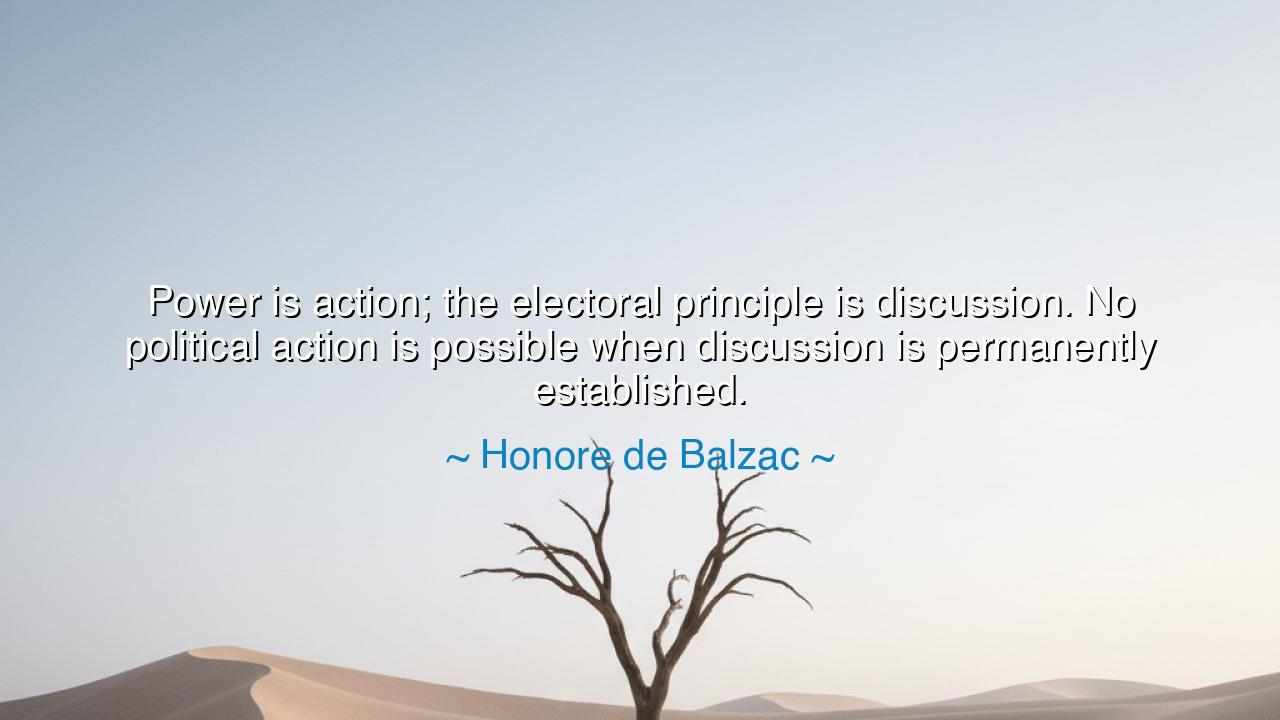
Power is action; the electoral principle is discussion. No
Power is action; the electoral principle is discussion. No political action is possible when discussion is permanently established.






In the realm of governance, there lies an eternal tension between action and discussion, between the sword that strikes and the voices that deliberate. Honoré de Balzac, master observer of human ambition, declared, “Power is action; the electoral principle is discussion. No political action is possible when discussion is permanently established.” His words unveil a profound truth: that power is not mere talk, but decisive motion, and that when endless debate rules unchecked, the hands of rulers grow idle, and nations stagnate.
Power is the force that shapes history. It is found in the building of cities, the waging of wars, and the creation of laws that bind a people together. Without action, a state is but a hollow shell, filled with promises but devoid of substance. Yet in the modern age, with its electoral principles, leaders are chosen through the voice of the people, through assemblies and councils that deliberate ceaselessly. Though this is noble in spirit, it carries a hidden danger: that discussion may become an end in itself, a perpetual circle where words replace deeds.
History has shown this peril time and again. In the final days of the Roman Republic, the Senate was filled with debate while Rome’s enemies gathered strength at its borders. Julius Caesar, frustrated by endless disputes, marched across the Rubicon and seized control, declaring that decisive action must replace futile discussion. Though his act ushered in empire and order, it also brought the death of the republic, proving that imbalance on either side—endless talk or unchecked action—can lead to ruin.
Consider also the fate of France during the early years of the Revolution. The National Assembly, driven by lofty ideals, engaged in endless speeches and debates while chaos spread through the streets. This paralysis invited the rise of Napoleon Bonaparte, a man of pure action, who swept away the talking chambers with the force of his armies. The people, weary of confusion, embraced his rule, preferring the certainty of a decisive hand to the weakness of perpetual quarrels.
Thus, Balzac’s words echo like a warning bell to all generations: discussion is the foundation of freedom, but it must not become a cage that binds a nation’s will. Leaders must listen, but they must also act. A state that speaks without moving will eventually fall prey to those bold enough to seize power. Let the wise ruler seek balance—deliberate with care, then strike with courage. For only when words and deeds walk together can a people thrive, and only then can the destiny of a nation be shaped by both the voice of its citizens and the strength of its leaders.






AAdministratorAdministrator
Welcome, honored guests. Please leave a comment, we will respond soon